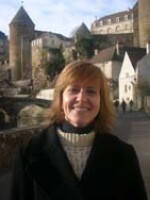KELLY MCEVERS, HOST:
Rescuers in Italy are still searching for survivors after Tuesday's magnitude 6 earthquake in the central part of the country. At least 250 people are dead. Even those whose homes were not flattened might not might never be able to go back to them. NPR's Eleanor Beardsley reports.
ELEANOR BEARDSLEY, BYLINE: I'm walking down into the village of Amatrice from the top where they've blocked cars from entering, and, God, you just walk by houses with the whole back falling off. I'm looking at someone's bedroom. There's still pictures on the wall. There are helicopters parked in fields here. The Italian army is out. There are rescue crews. There are bulldozers. There are people preparing food and tent cities being set up right outside of town in fields.
Amatrice is one of the heaviest hit towns. The mayor says some 200 people may have died here just as the village was preparing for an annual food festival celebrating its famous Bucatini all'Amatriciana pasta dish. There are giant cracks in walls, crumbled houses and cars buried beneath rubble in almost every little village you pass.
UNIDENTIFIED MAN: (Speaking Italian).
UNIDENTIFIED WOMAN: (Speaking Italian).
BEARDSLEY: In the hamlet of Retrosi just a mile or so beyond Amatrice, the wall of a church looks ready to collapse in the street. That's where I run into Francesco Luci, who has come to check on his home.
FRANCESCO LUCI: I came from Rome today to see the damages.
BEARDSLEY: Luci grew up in Retrosi and keeps his parents' house as a second home. Donning a motorcycle helmet, he begins to pick his way over the rubble. His house is still standing, but it's full of cracks, and he says he doesn't dare go inside.
The next stop is the local cemetery. It's like a village for the dead with hundreds of ornate, above-ground mausoleums. Rooves have collapsed. Metal gates are mangled and grave slabs shattered. Patricia Di Domenico says she relieved that her family's mausoleum is still intact.
PATRICIA DI DOMENICO: My father, my mother live and born here.
BEARDSLEY: And is your house OK here?
DI DOMENICO: No, no.
BEARDSLEY: Though they may never return to their vacation homes, these people know they're the lucky ones.
(CROSSTALK)
BEARDSLEY: A few miles away in a field just outside the village of Santa Anna, workers are setting up rows of tents. This camp can house 300 people displaced by the earthquake. Andrea Lazzari is a volunteer with a Catholic organization. He says the earthquake is particularly hard on old people.
ANDREA LAZZARI: And so here we have a lot of old people and there's a lot of psychological problem because they have lost all his life.
BEARDSLEY: Many have lost everything they ever had in the disaster, says Lazzari. Cooks at the camp are boiling up vats of pasta. Ninety-year-old Ida Magnifici is having lunch. Under her clothes, she still has her pajamas from when the quake hit Wednesday night.
IDA MAGNIFICI: (Speaking Italian).
BEARDSLEY: Magnifici says the door wouldn't open, and then pieces of the wall began falling out. "And I saw the devil," she says. Magnifici says she was born, married and raised her own children in Santa Anna and can't imagine living anywhere else, though she's delighted her interview will air in America.
MAGNIFICI: America (laughter).
BEARDSLEY: She says this pasta's OK, but it isn't cooked perfectly, and she's having a hard time because she left her false teeth in her house. Magnifici says she made the perfect pesto pasta at home in her kitchen. Eleanor Beardsley, NPR News, Santa Anna, Italy. Transcript provided by NPR, Copyright NPR.


